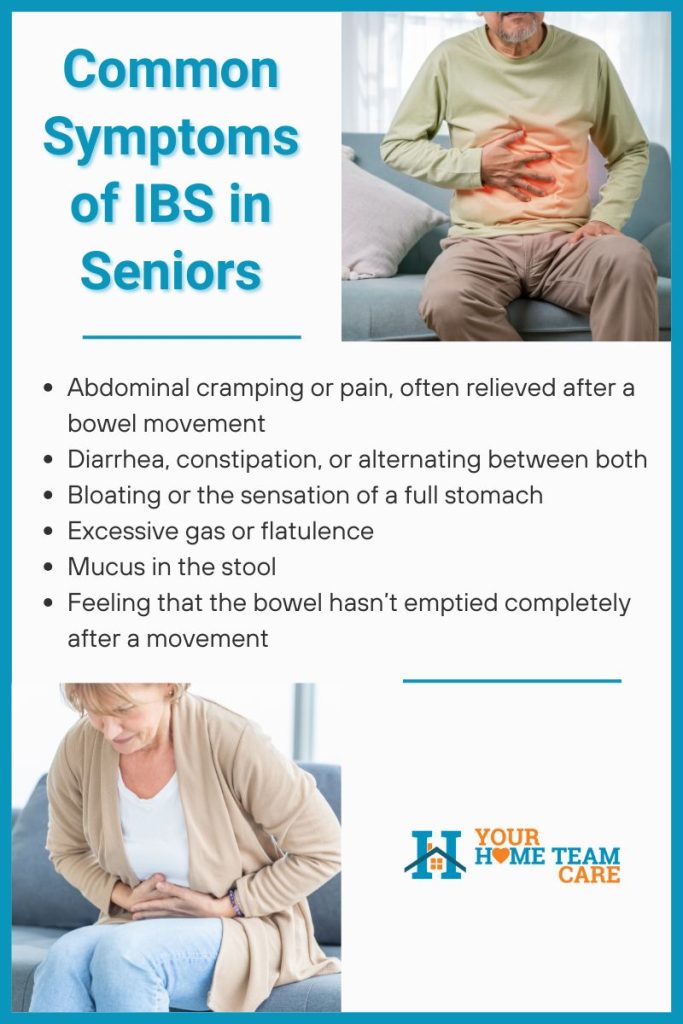One common but often overlooked condition that can impact seniors is Irritable Bowel Syndrome (IBS). If your senior loved one has been experiencing stomach discomfort, bloating, or irregular bowel movements, it could be IBS.
In this blog post, we’ll explore what IBS is, its causes, how it affects seniors, and most importantly, how you can help your loved one manage the condition and improve their quality of life.
What is Irritable Bowel Syndrome (IBS)?
Irritable Bowel Syndrome (IBS) is a chronic gastrointestinal disorder that affects the large intestine. It’s characterized by symptoms like abdominal pain, bloating, gas, diarrhea, and constipation. The exact cause of IBS isn’t fully understood, but it involves an imbalance in the way the brain and digestive system communicate. While IBS can affect people of any age, it tends to become more noticeable in older adults due to changes in the digestive system that come with aging.
How IBS Affects Seniors
For seniors, IBS can pose specific challenges:
- Changes in Digestive Function: As we age, the digestive system naturally becomes slower and less efficient. Seniors may experience a decrease in digestive enzyme production, making it harder for their bodies to process certain foods.
- Weakened Immune System: Seniors typically have a weaker immune system, which can make them more susceptible to gut infections and inflammation, further triggering IBS symptoms.
- Medications: Many seniors take medications for other health conditions, and some of these medications can irritate the digestive system or exacerbate IBS symptoms, leading to additional discomfort.
- Increased Stress: The aging process often brings emotional and physical stressors that can affect gut health. Stress is a major trigger for IBS, and managing emotional well-being is critical in preventing flare-ups.

Symptoms of IBS can vary from person to person but commonly include:
Causes of IBS in Seniors
While the exact cause of IBS remains unclear, several factors may contribute to the development or worsening of the condition, especially in seniors:
- Gut Sensitivity: Seniors may experience heightened sensitivity in the gut, making it more prone to discomfort and abnormal contractions.
- Changes in Gut Flora: The microbiome (the community of bacteria in the gut) plays a major role in digestion and overall health. As we age, the diversity and balance of these bacteria can change, potentially triggering IBS symptoms.
- Dietary Factors: Foods that are difficult to digest, such as dairy products, fatty foods, and processed foods, can trigger IBS flare-ups.
- Physical Inactivity: Reduced physical activity is common among seniors, which can lead to constipation and other gastrointestinal issues.
- Chronic Stress: Emotional stress or a history of traumatic life events can lead to IBS flare-ups in older adults, as the gut and brain are closely connected.
How to Help Seniors Manage IBS
There are several ways you can support your senior loved one in managing IBS and improving their quality of life. Here are some helpful tips:
1. Encourage a Fiber-Rich Diet
Fiber is crucial for healthy digestion and can help regulate bowel movements. Depending on whether your loved one experiences more diarrhea or constipation, the type of fiber they need may vary:
- Soluble fiber (found in oats, beans, and fruits like apples and bananas) can help with diarrhea.
- Insoluble fiber (found in whole grains, vegetables, and seeds) can assist with constipation.
Encourage your loved one to consume small amounts of fiber throughout the day rather than large portions at once. Gradually increasing fiber intake can help avoid bloating and discomfort.
2. Promote Regular Physical Activity
Encouraging your loved one to engage in regular, gentle exercise, such as walking, swimming, or yoga, can help stimulate digestion and alleviate constipation. Regular physical activity also reduces stress, which can be a major trigger for IBS flare-ups.
3. Stress Management Techniques
Since stress can worsen IBS symptoms, it’s essential to help seniors manage their emotional health. Simple relaxation techniques such as deep breathing exercises, mindfulness meditation, or even gentle stretching can make a significant difference. Consider suggesting activities like knitting, reading, or listening to soothing music to help your loved one relax.
4. Monitor and Modify Their Diet
Certain foods are known to trigger IBS symptoms. Some common irritants include:
- Dairy products (especially in those with lactose intolerance)
- Fatty or fried foods
- Processed foods and high-sugar foods
- Caffeinated beverages
- Alcohol
Keeping a food journal can help identify specific triggers. Once identified, try to eliminate or reduce those foods from their diet. A nutritionist or dietitian can also offer guidance tailored to your loved one’s needs.
5. Consider Probiotics
Probiotics are beneficial bacteria that can help restore balance to the gut flora. Some studies have shown that taking probiotics may help alleviate IBS symptoms, especially bloating and irregular bowel movements. Always consult with a healthcare provider before introducing new supplements.
6. Encourage Regular, Consistent Meal Times
Eating meals at consistent times each day helps regulate the digestive system and can prevent IBS flare-ups. Smaller, more frequent meals are often easier on the stomach than larger ones.
When to Seek Professional Help
If your loved one’s IBS symptoms worsen, or if they experience sudden and severe changes in their bowel habits, it’s important to seek medical attention. A healthcare provider can help rule out other conditions and develop a personalized treatment plan.
Some signs that it’s time to visit the doctor include:
- Significant weight loss
- Blood in the stool
- Difficulty swallowing
- Persistent nausea or vomiting
Helpful Resources
For more information on IBS and how it affects seniors, here are some trusted websites you can turn to:
- International Foundation for Gastrointestinal Disorders (IFFGD): www.iffgd.org
- National Institute of Diabetes and Digestive and Kidney Diseases (NIDDK): www.niddk.nih.gov
- Mayo Clinic – IBS Overview: www.mayoclinic.org
- IBS Network: www.ibsnetwork.org
Irritable Bowel Syndrome can be challenging for seniors, but with the right approach and a little extra care, it’s possible to manage the symptoms and improve their quality of life. By encouraging a healthy diet, promoting regular physical activity, and providing emotional support, you can help your loved one live comfortably despite their IBS. Always consult with a healthcare provider for personalized advice and treatment, and remember that with the right tools and strategies, IBS doesn’t have to control their life.
If you have any tips or experiences with managing IBS in seniors, feel free to share in the comments below. We’re all in this together!

